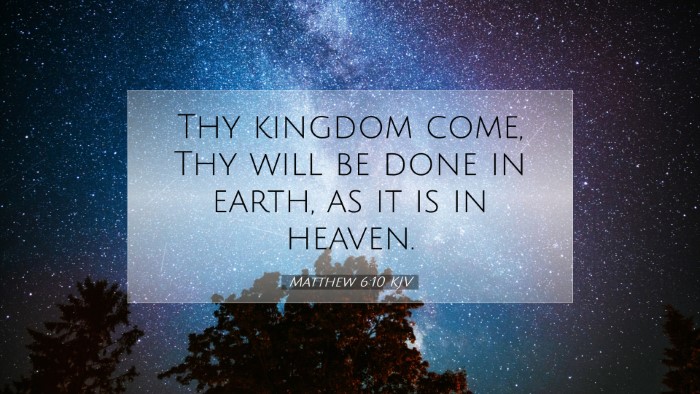Commentary on Matthew 6:10
Matthew 6:10 states: "Your kingdom come. Your will be done, on earth as it is in heaven." This verse forms part of the Lord's Prayer and encapsulates fundamental Christian principles regarding divine sovereignty and the believer's role in God's kingdom. Below is a synthesis of insights drawn from public domain commentaries by Matthew Henry, Albert Barnes, and Adam Clarke, which aims to provide a deep understanding of this verse for pastors, students, theologians, and Bible scholars.
1. Contextual Analysis
The context of Matthew 6 is critical to understanding verse 10. The Lord's Prayer emerges during Jesus’ Sermon on the Mount, where He instructs the disciples on the nature of true righteousness and prayer. The phrase "Your kingdom come" indicates a longing for the full realization of God's reign both in the present and eschatological sense. Such an assertion denotes an acknowledgment that God's kingdom is presently at work but awaits completion.
2. The Kingdom of God
Meaning and Implications:
- Present and Future Kingdom: Matthew Henry emphasizes that "Your kingdom come" reflects both the active presence of God's reign in the hearts of believers and the future consummation when Christ returns.
- Transformation of Society: Albert Barnes points out that the prayer indicates a desire for the principles of God's kingdom — justice, mercy, and truth — to manifest in earthly affairs.
- Spiritual Focus: Adam Clarke suggests that this prayer aligns believers with a spiritual outlook, recognizing that earthly kingdoms are transient while God's kingdom is eternal.
3. "Your Will Be Done"
Understanding Divine Will:
- Submission and Obedience: The plea "Your will be done" suggests a deep submission to God's authority. Matthew Henry argues that it is imperative for believers to desire God's will above their own, manifesting their ultimate trust in God's plan.
- Manifestation of God's Will: Barnes notes that this petition calls on believers to actively seek and facilitate the execution of God's will on earth — a transformative process involving both personal and communal responsibilities.
- Heavenly Compliance: Clarke highlights that the phrase serves as a reminder of the exemplar obedience seen in heaven, where angels fulfill God's commands without question or hesitation, encouraging believers to emulate that same fidelity.
4. The Relationship Between Heaven and Earth
This verse establishes an intrinsic connection between divine and earthly realms:
- Mirroring Heaven: When praying for God's will to be done "on earth as it is in heaven," believers affirm their desire for earthly actions to reflect divine order and grace. This highlights the believer's role in aligning with God's purposes.
- Impact on Society: Both Henry and Barnes concur that this prayer encourages believers to engage actively in societal reform towards justice and righteousness, as a manifestation of their faith.
- Individuall and Cosmic Scope: Clarke emphasizes that this petition is not limited to personal spirituality but has cosmic implications, as it anticipates the restoration of creation and humans' roles therein.
5. Application for Believers
Understanding Matthew 6:10 has varied applications for contemporary believers:
- Prayer Life: This verse serves as a guide for how believers approach prayer, shifting focus from mere requests to a contemplation of God's majesty and purpose.
- Commitment to Justice: Engaging with social issues from a scriptural perspective becomes essential. This verse urges Christians to be agents of change, echoing God's will in their communities.
- Ultimately Eschatological Hope: The acknowledgment of a future fulfillment of God's kingdom encourages perseverance in faith, giving believers hope amid tribulations.
Conclusion
Matthew 6:10 encapsulates a rich theological framework essential for understanding the Christian life. It embodies the tension between the present reality of God's kingdom and its future consummation, illustrates the relationship believers have with God's will, and calls for active participation in bringing about God's purposes on earth. Insights from Matthew Henry, Albert Barnes, and Adam Clarke provide a comprehensive understanding that fosters a deeper engagement with prayer, social justice, and eschatological hope among modern believers.


